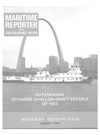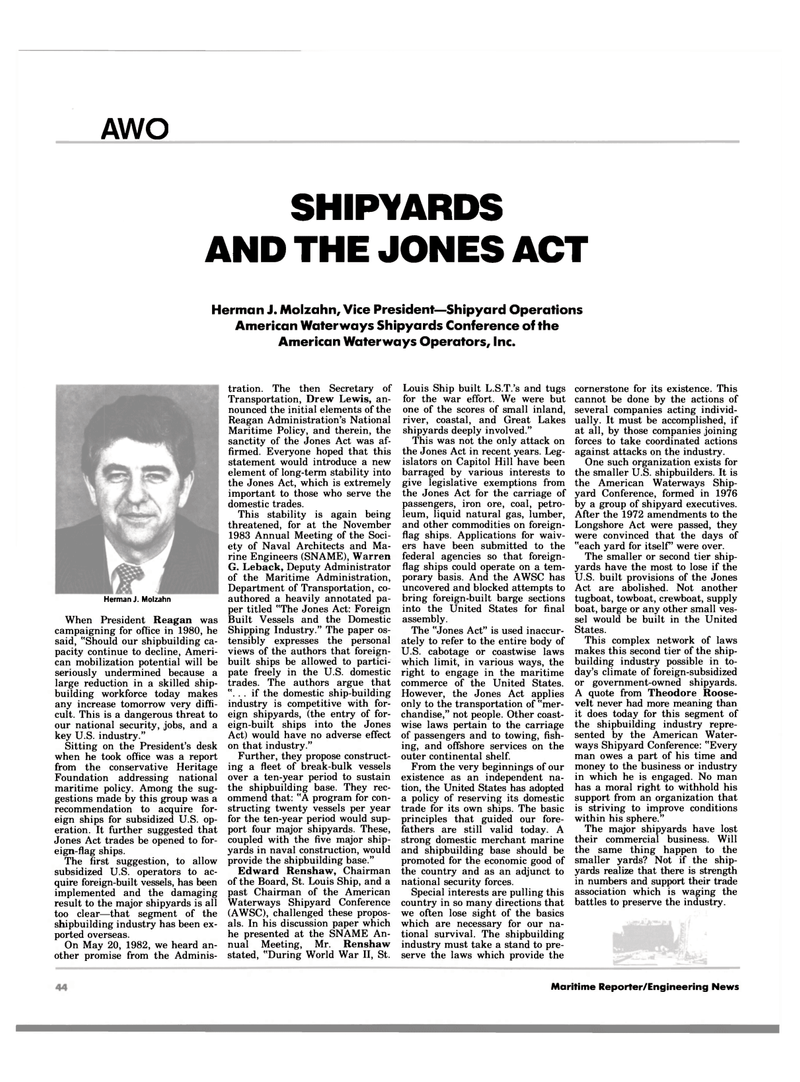
Page 44: of Maritime Reporter Magazine (January 1984)
Read this page in Pdf, Flash or Html5 edition of January 1984 Maritime Reporter Magazine
AWO
SHIPYARDS
AND THE JONES ACT
Herman J. Molzahn, Vice President—Shipyard Operations
American Waterways Shipyards Conference of the
American Waterways Operators, Inc.
Herman J. Molzahn
When President Reagan was campaigning for office in 1980, he said, "Should our shipbuilding ca- pacity continue to decline, Ameri- can mobilization potential will be seriously undermined because a large reduction in a skilled ship- building workforce today makes any increase tomorrow very diffi- cult. This is a dangerous threat to our national security, jobs, and a key U.S. industry."
Sitting on the President's desk when he took office was a report from the conservative Heritage
Foundation addressing national maritime policy. Among the sug- gestions made by this group was a recommendation to acquire for- eign ships for subsidized U.S. op- eration. It further suggested that
Jones Act trades be opened to for- eign-flag ships.
The first suggestion, to allow subsidized U.S. operators to ac- quire foreign-built vessels, has been implemented and the damaging result to the major shipyards is all too clear—that segment of the shipbuilding industry has been ex- ported overseas.
On May 20, 1982, we heard an- other promise from the Adminis- tration. The then Secretary of
Transportation, Drew Lewis, an- nounced the initial elements of the
Reagan Administration's National
Maritime Policy, and therein, the sanctity of the Jones Act was af- firmed. Everyone hoped that this statement would introduce a new element of long-term stability into the Jones Act, which is extremely important to those who serve the domestic trades.
This stability is again being threatened, for at the November 1983 Annual Meeting of the Soci- ety of Naval Architects and Ma- rine Engineers (SNAME), Warren
G. Leback, Deputy Administrator of the Maritime Administration,
Department of Transportation, co- authored a heavily annotated pa- per titled "The Jones Act: Foreign
Built Vessels and the Domestic
Shipping Industry." The paper os- tensibly expresses the personal views of the authors that foreign- built ships be allowed to partici- pate freely in the U.S. domestic trades. The authors argue that ". . . if the domestic ship-building industry is competitive with for- eign shipyards, (the entry of for- eign-built ships into the Jones
Act) would have no adverse effect on that industry."
Further, they propose construct- ing a fleet of break-bulk vessels over a ten-year period to sustain the shipbuilding base. They rec- ommend that: "A program for con- structing twenty vessels per year for the ten-year period would sup- port four major shipyards. These, coupled with the five major ship- yards in naval construction, would provide the shipbuilding base."
Edward Renshaw, Chairman of the Board, St. Louis Ship, and a past Chairman of the American
Waterways Shipyard Conference (AWSC), challenged these propos- als. In his discussion paper which he presented at the SNAME An- nual Meeting, Mr. Renshaw stated, "During World War II, St.
Louis Ship built L.S.T.'s and tugs for the war effort. We were but one of the scores of small inland, river, coastal, and Great Lakes shipyards deeply involved."
This was not the only attack on the Jones Act in recent years. Leg- islators on Capitol Hill have been barraged by various interests to give legislative exemptions from the Jones Act for the carriage of passengers, iron ore, coal, petro- leum, liquid natural gas, lumber, and other commodities on foreign- flag ships. Applications for waiv- ers have been submitted to the federal agencies so that foreign- flag ships could operate on a tem- porary basis. And the AWSC has uncovered and blocked attempts to bring foreign-built barge sections into the United States for final assembly.
The "Jones Act" is used inaccur- ately to refer to the entire body of
U.S. cabotage or coastwise laws which limit, in various ways, the right to engage in the maritime commerce of the United States.
However, the Jones Act applies only to the transportation of "mer- chandise," not people. Other coast- wise laws pertain to the carriage of passengers and to towing, fish- ing, and offshore services on the outer continental shelf.
From the very beginnings of our existence as an independent na- tion, the United States has adopted a policy of reserving its domestic trade for its own ships. The basic principles that guided our fore- fathers are still valid today. A strong domestic merchant marine and shipbuilding base should be promoted for the economic good of the country and as an adjunct to national security forces.
Special interests are pulling this country in so many directions that we often lose sight of the basics which are necessary for our na- tional survival. The shipbuilding industry must take a stand to pre- serve the laws which provide the cornerstone for its existence. This cannot be done by the actions of several companies acting individ- ually. It must be accomplished, if at all, by those companies joining forces to take coordinated actions against attacks on the industry.
One such organization exists for the smaller U.S. shipbuilders. It is the American Waterways Ship- yard Conference, formed in 1976 by a group of shipyard executives.
After the 1972 amendments to the
Longshore Act were passed, they were convinced that the days of "each yard for itself' were over.
The smaller or second tier ship- yards have the most to lose if the
U.S. built provisions of the Jones
Act are abolished. Not another tugboat, towboat, crewboat, supply boat, barge or any other small ves- sel would be built in the United
States.
This complex network of laws makes this second tier of the ship- building industry possible in to- day's climate of foreign-subsidized or government-owned shipyards.
A quote from Theodore Roose- velt never had more meaning than it does today for this segment of the shipbuilding industry repre- sented by the American Water- ways Shipyard Conference: "Every man owes a part of his time and money to the business or industry in which he is engaged. No man has a moral right to withhold his support from an organization that is striving to improve conditions within his sphere."
The major shipyards have lost their commercial business. Will the same thing happen to the smaller yards? Not if the ship- yards realize that there is strength in numbers and support their trade association which is waging the battles to preserve the industry. 18 Maritime Reporter/Engineering News

 43
43

 45
45
